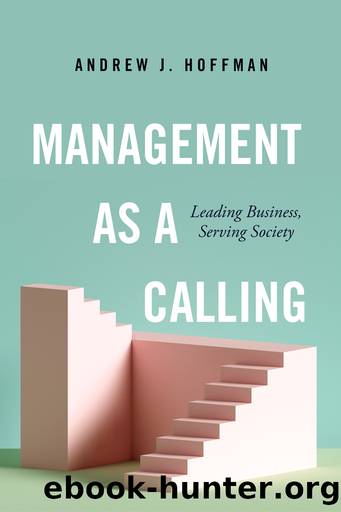Management as a Calling by Andrew J. Hoffman

Author:Andrew J. Hoffman
Language: eng
Format: epub
Publisher: Stanford University Press
Published: 2020-09-15T00:00:00+00:00
CHAPTER 11
THE RADICAL FLANK AND THE CLIMATE CHANGE DEBATE
âWe need to view the fossil-fuel industry in a new light. It has become a rogue industry, reckless like no other force on Earth. It is Public Enemy Number One to the survival of our planetary civilization.â
WITH THESE WORDS in Rolling Stone magazine in 2012, environmental activist Bill McKibben launched a radical and moral broadside against the fossil-fuel industry and its contributions to climate change.1 In a coordinated move, the McKibben-founded climate advocacy group 350.org launched its Go Fossil Free: Divest from Fossil Fuels! campaign with a stated goal to ârevoke the social license of the fossil fuel industry.â With the help of activist college students, the movement sought to stigmatize fossil-fuel companies, restrict future cash flows, and depress share prices by compelling universities to divest their holdings in these companies.
The effort seems to some to have been a failure, at least by the financial measures that were laid out.2 Only a limited number of institutions have divested their endowments, and the stocks of major fossil-fuel companies show little effect. But in doing a network text analysis of news articles, Todd Schifeling of Temple University and I found that by other measures the effort has been a success.3 Exhibiting a phenomenon in the social sciences called the âradical flank effect,â McKibben and 350.org have dramatically altered the climate change debate in the United States by expanding its scope, reorienting its center, and injecting new ideas and concepts to help focus the true depth of the issue. Their success on this dimension offers important insights for business leaders to understand critical dynamics of the broad ecology of political, social, and market shifts and how they may play a role in their development.4
ORIGINS IN THE CIVIL RIGHTS MOVEMENT
The radical flank effect was first introduced by sociologist Herbert Haines in 1984,5 when he studied the civil rights movement of the 1960s. What he saw was that when Martin Luther King Jr. first began speaking his message of racial equality, it was perceived as too radical for the majority of white America. But Malcolm X entered the debate and extended the radical flank by rejecting white America and its Christian values, and preaching the supremacy of blacks over whites. As a result, his message made Kingâs message of nonviolent direct action and passive resistance look moderate by comparison.
Download
This site does not store any files on its server. We only index and link to content provided by other sites. Please contact the content providers to delete copyright contents if any and email us, we'll remove relevant links or contents immediately.
Time Management Made Easy: How to Cultivate New Habits, Improve Productivity and Get Things Done by Joshua Strachan(2419)
The 7 Habits of Highly Effective People by Stephen R. Covey & Sean Covey(2269)
The Concise Laws of Human Nature by Robert Greene(1917)
Doesn't Hurt to Ask by Trey Gowdy(1641)
Primal Leadership by Daniel Goleman(1286)
Hook Point: How to Stand Out in a 3-Second World by Brendan Kane(1250)
Don't Sweat the Small Stuff...and It's All Small Stuff by Richard Carlson(1123)
The Power of 100! by Shaun King(1100)
HBR's 10 Must Reads 2021 by unknow(1099)
Amazon Unbound by Brad Stone(1047)
100 Things Successful People Do by Nigel Cumberland(1031)
Master of One by Jordan Raynor(1008)
HBR's 10 Must Reads 2021 by Harvard Business Review(1008)
The Job Closer by Steve Dalton(996)
Lives of the Stoics by Ryan Holiday & Stephen Hanselman(970)
Declutter Your Mind: A step by step guide to learn to control your thoughts, stop worrying, relieve anxiety and eliminate panic attacks and negative thinking by Mia Chandler(970)
Conflicted by Ian Leslie(873)
The Book of Hope by Jane Goodall(873)
Coders at Work: Reflections on the craft of programming by Peter Seibel(848)
